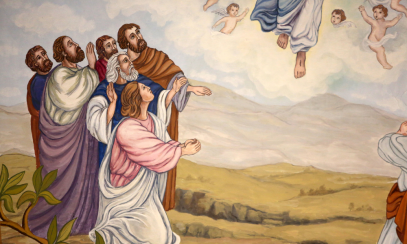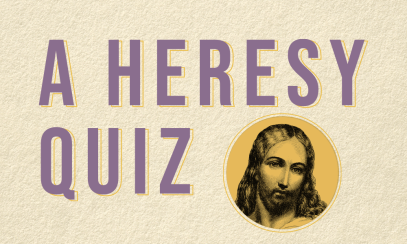Why Did Jesus Heal Some and Not Others? By His Touch We Are Healed.
Who is Christ? A Year-Long Conversation With Theologians.
Who is Christ? A Year-Long Conversation With Theologians.
FAITH is exploring Christology – the study of Jesus Christ. We asked several eminent seminary professors some questions about Jesus. Their answers are enlightening and thought-provoking.
Father Thomas Acklin is on the faculty of St. Vincent Abbey in Latrobe, PA. He is a graduate of Duqesne University, St. Vincent Seminary, The Catholic University of Louvain and Pittsburgh Psychoanalytic Institute.
Father Earl Muller is on the faculty at Sacred Heart Seminary in Detroit. He formerly taught at Marquette University in Wisconsin.
Father Gladstone Stevens is on the faculty of St. Mary Seminary in Baltimore.
FAITH: Jesus is often presented as a healer. Why did he heal only some and not others?
Father Stevens: Why did he heal anybody? We can’t see Jesus’ ministry as something he owes us. The fact that he even healed one person is a cause of wonder, gratitude and awe. The fact that it happened often makes us seem ungrateful. We also can’t separate his healing ministry from his preaching ministry – the proclamation of the kingdom is not one thing he does among others. When he heals a blind person, the person can also see a path. They can follow him in a way not currently available to them. The woman with the flow of blood is ritually impure and cannot be part of the community until Jesus heals her. His healings all restored people to fellowship and communion, which is what the kingdom is all about. In a sense, each of his healings brings out a different aspect of his kingdom. He empowers all humanity to be participants in the kingdom.
Father Acklin: There has been a tendency to take a rationalistic approach to miracles – to write them off. For example, the miracle of the loaves and fishes has been reduced to a beautiful story, but not a supernatural one. I believe in miracles – they always come where there is great faith. The faith Jesus calls for when he is performing a miracle is not something that is required because Jesus is unable to perform it otherwise. When Jesus performed miracles, there was always a request and interaction – always a summoning of faith. Jesus didn’t simply wave his hand and make magic. He wants us to participate in faith – as when he said to his disciples, “You give them something to eat yourselves.”
God never performs gratuitous miracles – he comes down into our very suffering. He didn’t raise Lazarus from the dead without participating in the grief. The Last Supper didn’t happen without the washing of the feet. The Eucharist is a miracle in which we must participate by receiving. We need to listen to God’s answers to our prayers – often as miracles. God gives people something different than what they requested.
We sometimes cannot find him in suffering, because he is not working a miracle from outside but is right there in the middle of the suffering. For example, in the Holocaust, God was in the smoke and the fire – in there with his people. Jesus gave us the model for our prayer in the Our Father and then lived it out in his prayer in Gethsemane. We ask for what we need, but then say, “Your will be done.” This allows God to give us what is best for us.
Father Muller: Part of the issue of healing is the connection that physical disability or illness has with demonic powers. So, when Jesus came and opposed the forces of evil, one manifestation of that is physical healing. It shows concretely an undoing of the effects of sin. Illness and death are understood to flow from the sin of Adam. Christ came not just to save our souls but our whole realities, and we are creatures of body and soul. So, saving us involves saving our bodies. Healings give testimony to the totality of the salvation that God brings.
Jesus’ healings are focused where faith can be evoked without being compelled. He did not perform signs for the scribes and Pharisees because these were people who were deliberately staying on the fence – had refused to make a decision about John the Baptist. To give them a sign would be to undo what he’d done with the temptations at the beginning of his ministry. If he’d floated down from the top of the Temple, the Jewish leaders would have been compelled to faith.
Theologian of the month – Thomas Aquinas (1225-1274)
Thomas was a younger son, destined by his family to become the abbot of the Benedictine monastery at Monte Cassino, succeeding his uncle. But while he was studying at the University of Naples, Thomas was drawn to the Dominicans, revolutionaries in the clerical world of the Middle Ages.
Thomas’ family objected strenuously – to the point of kidnapping him and holding him captive for more than a year in order to change his mind. It took an appeal to the pope to persuade them to allow Thomas to become a Dominican.
His most famous work, The Summa Theologiae, has profoundly influenced Catholic theology through the centuries.
Thomas is the author of the beautiful Office of Corpus Christi, which affirms the real presence of Jesus Christ in the Eucharist.
Heresy! Predestination: God has already decided who is saved
Heaven or hell – where are we going? According to predestinarians, God has already decided and there’s nothing we can do about it. Christ died for the elect, not the non-elect, who are already condemned. Although we cannot know what camp we are in, our actions may indicate what God has already decided – someone who is a mass murderer is probably not one of the elect, for example. Although predestination was condemned by the Council of Lyons in 475, it still exists today. One of its most famous adherents was John Calvin, for whom Calvinists are named. Predestination eliminates the concept of free will and universal salvation.
What does that symbol mean?
Peacock
The peacock is depicted in the catacombs and early churches as a symbol of Christ and the resurrection. The peacock represents immortality and its flesh was believed to have antiseptic qualities and to be incorruptible.
What is “Corpus Christi?”
Corpus Christi is Latin for “the body of Christ.”



